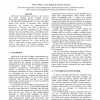Free Online Productivity Tools
i2Speak
i2Symbol
i2OCR
iTex2Img
iWeb2Print
iWeb2Shot
i2Type
iPdf2Split
iPdf2Merge
i2Bopomofo
i2Arabic
i2Style
i2Image
i2PDF
iLatex2Rtf
Sci2ools
135
click to vote
RSP
2008
IEEE
2008
IEEE
From Application to ASIP-based FPGA Prototype: a Case Study on Turbo Decoding
ASIP-based implementations constitute a key trend in SoC design enabling optimal tradeoffs between performance and flexibility. This paper details a case study of an ASIP-based implementation of a high throughput flexible turbo decoder. It introduces turbo decoding application and proposes an Application-Specific Instruction-set Processor with SIMD architecture, a specialized and extensible instruction-set, and 6-stages pipeline control. The proposed ASIP is developed in LISA language and generated automatically using the Processor Designer framework from CoWare. The paper illustrates how the automatic generated RTL code of the ASIP can be adapted for a rapid prototyping on FPGA reconfigurable logic and memory resources. For a Xilinx Virtex-II Pro FPGA, a single ASIP prototype occupies 68% of FPGA resources and achieves a 6.3 Mbit/s throughput when decoding a double binary turbo code with 5 iterations.
Asip-based Implementation | Rapid System Prototyping | RSP 2008 | Throughput Flexible Turbo | Turbo Decoding Application |
Related Content
| Added | 01 Jun 2010 |
| Updated | 01 Jun 2010 |
| Type | Conference |
| Year | 2008 |
| Where | RSP |
| Authors | Olivier Muller, Amer Baghdadi, Michel Jézéquel |
Comments (0)

